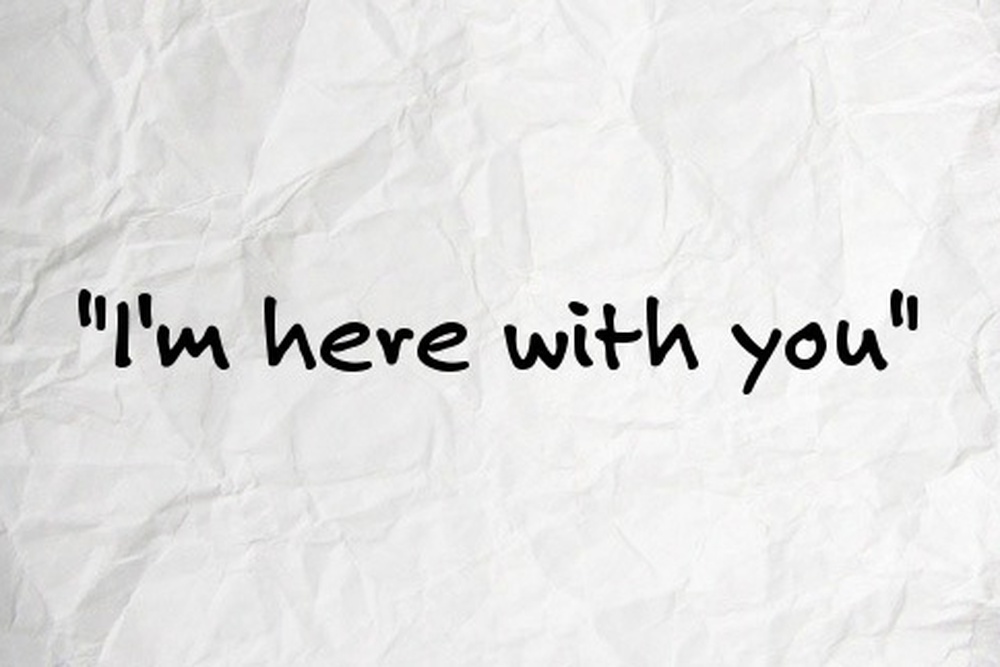You just found out that your best friend’s spouse died. Or a coworker lost her mother. When you hear that a friend is grieving, you may experience a range of emotions; concern for your friend, memories of your own losses resurfacing, or anxiety about what to say or how to help.
Many people don’t know what to say to a grieving friend. Some might not reach out for fear of saying the wrong thing. Others offer platitudes that can do more harm than good.
If you are not sure what to say, don’t let that stop you from being there for your friend. In reality, there is nothing you can say that will take the pain away. Instead of worrying about what to say, focus on how to communicate your support.

How to Help Someone Who is Grieving
- Be There. Let your friend know that you are there for him or her. More important than what you say is the fact that you called, wrote, or showed up.
- Be specific. It’s okay to ask, “Is there anything I can do?” but it is even better to offer something specific. “I’ll drop off dinner next Wednesday. Is lasagna okay?” Practical help is often appreciated, as people who are grieving can be overwhelmed with daily tasks. Offer to go food shopping, bring the kids to sports practice, help with funeral arrangements, or write thank you cards. If your friend needs help planning a funeral, check out our information about planning a funeral.
- Be honest. It is okay to tell your friend, “I don’t know what to say, but I want you to know that I love you.” It is also okay to refer to the loss as a “death” and to the person as “dead.” This helps your friend know that you are willing to talk openly and honestly about what happened.
- Be a good listener. Avoid offering advice. Instead, listen to what your friend needs. “What is this like for you?”, “How are you doing today?”, “What do you want me to know about what you are going through?” are some ways to start listening.
- Be accepting. Many complicated feelings arise when someone dies. Not all of them are sadness. Anger, relief, levity, frustration, and fear are also common reactions. There is no right or wrong way to grieve. Accept the full range of emotions that your friend expresses.
- Be okay with silence. If you don’t know what to say, don’t say anything. It is okay to sit quietly. To hold hands while they cry. Just being present while your friend grieves is incredibly powerful. Our culture teaches us to “fix” things, but grief isn’t something that needs to be fixed. Grief needs to be experienced, and being a quiet witness to that process is often the most supportive thing you can do.
- Be there for the long haul. Newly bereaved people are sometimes overwhelmed with support and visiting family immediately following the death. But a few weeks or months later, isolation can become a reality. This may be when your most important role begins. Be the friend who is still calling and checking in three months after the death. An extra call or visit on holidays or anniversaries is also an important sign that you care.
Things You Should Say When Someone is Grieving
- “I’m here with you.”
- “I love you.”
- “I’m so sorry.”
- “What do you want me to know about what you are going through?”
- “I’ll drop off dinner next Tuesday.”
- “I remember…”
- “I don’t know what to say, but I want you to know that I’m here.”

Things You Shouldn't Say When Someone is Grieving
The most important thing to remember about grief is that it is individual, and be-longs to the person experiencing it. Just like there is no one “right” thing to say, there is no universal “wrong” thing either. Yet, most people who have just experi-enced a loss tell us the following statements are not helpful:
- “I know how you feel.” Avoid going into detail about your own losses, even if they are similar. Each person experiences grief in a unique way. We can never know what another person feels.
- “It will get better.” Even if the acute pain of grief does change over time, most people who have experienced a death of a loved one don’t find this statement helpful. It diminishes the pain being felt at that moment.
- “(S)he’s in a better place.” Avoid saying things that are based in belief or opinion, not fact. Even if you shared a similar faith before the loss, you cannot assume your friend still feels the same way.
- “Everything happens for a reason/It’s God’s plan.” This is another statement that is dependent on a particular world view, and your friend might not agree.
- “Be strong for ….” Statements like this diminish the importance of experiencing grief fully. They also imply that grieving is weak. Feeling grief and sharing those feelings with others takes a tremendous amount of strength.
- Any statement that starts with “You should…” or “You will…” Avoid statements that imply you know more than the grieving person about what to expect or what to do. Your friend may be lost and be looking for guidance. Provide practical help, but don’t tell someone else how to feel or act.
When to Get Help for a Grieving Friend

Grief is a long and complicated process. There is no time frame for when people should be “over” their grief. But there are signs that your friend may need professional support.
- Drug or alcohol abuse. Any risky behaviors that are endangering the health or safety of your friend should be taken seriously. This may include increased drug or alcohol use, gambling, or risk taking behavior. These behaviors also indicate an increased risk for suicide.
- Difficulty completing daily tasks after several months have passed. Although there is no time limit for grief, there is reason for concern if your friend is experiencing debilitating signs of grief after several months. Changes in personal hygiene habits, inability to make meals, or pay important bills may be warning signs. This is particularly concerning if you see things getting worse over time instead of better.
- Significant withdrawal. If your friend is withdrawing from many of the activities and people who were once very important to him or her, or expresses constant feelings of hopelessness or helplessness, these are signs that your friend may need to speak with a professional.
- Any talk of hurting themselves. Take any talk of suicide or hurting oneself seriously. Even though it is not uncommon for someone to make a statement like, “I wish it was me who died,” don’t brush these statements off. Follow up with a direct question, such as “Have you ever seriously considered hurting yourself?” Don't be afraid to bring up suicide and ask directly. If you think your friend is at risk, don’t leave him/her alone. Bring your friend to a crisis center, emergency room, or call 911.
- Disconnection from reality. If your friend is experiencing hallucinations (seeing or hearing things that aren’t there), believes her loved one is still alive, or searches for the deceased, it is time to get help.
If you think your friend needs professional support, help identify resources. Offer to take your friend to the first appointment. Someone who needs professional help coping with grief might need help getting help.
Grieving Children

Children often get forgotten during times of grief. Because they often express grief differently than adults, it can be even harder to find ways to talk to kids about death. Yet, it is critical that children have the support they need when someone dies.
Age impacts how a child will understand and respond to death. Young children may not understand what death is, or that it is permanent. They may act angry, not want to be alone, or regress backwards in their development (for example, start wetting the bed again, or wanting toys they had outgrown). Without the words to express how they feel, young children may act out their grief through behaviors.
School age children are often fearful when a loved one dies. They may think the death was their fault, or that they could have prevented it. It is not uncommon for children to behave very well, or very badly, and to alternate between the two.
Teenagers are able to understand death and think about the consequences. They may withdraw, or want to spend time with their friends instead of family. They may begin engaging in risky behavior.
Talking with Children About Death
- Be honest. Children are aware of more than you think. And what they don’t hear directly from you, they will find out in other ways. Be honest when speaking with children about death. Use simple language and check in often to see what they understood.
- Let them ask questions. It is important for children to feel safe, and to be allowed to ask whatever questions they have. They may ask the same question over and over. This is normal and indicates the need for reassurance.
- Provide reassurance. Children of all ages need reassurance during a trage Help make children feel safe. Keep routines familiar and make as few changes as possible.
- Let kids be kids. Kids grieve differently than adults. They may switch quickly from talking about a death to playing outside. They may not talk about it much at first, but bring it up often months later. Kids may not be comfortable talking directly about the death, but may act it out through play or drawing.
Other Things to Remember
- Grieving doesn’t only happen after a death. People grieve for a variety of losses- the loss of a job, a home, a marriage, belief system, a pet, or their health.
- Grieving doesn’t happen in neat stages. You may have heard of the five stages of grief: denial, anger, bargaining, depression, and acceptance. Although these stages are a helpful guideline for what someone might experience, they were not meant to be a linear timeline. Everyone grieves differently, and it is not necessary to experience every stage, nor will most people experience them in a certain order. Grief is more like a rollercoaster than a train track. There will be moments when feelings are overwhelming, and moments of calm. There will be times of going backwards and turning upside down. There is no prescribed path for grief.
- Take a step back. Helping your friend during a period of grief is a tremendous gift. It is important to check in with yourself often to notice how this role is affecting you. Being there for someone who is grieving can be exhausting, and can bring up feelings related to deaths that you’ve experienced. Take time when you are not with your friend to care for yourself. Think about how much time you can really give to your friend and honor those boundaries. Find someone else you can talk to about how helping your friend is impacting you. You may feel guilty about having fun or spending time with your loved ones. Yet, in order to be a good friend, you have to take care of yourself first. Your friend will need your support for a long time, and it is important that you don’t burn out by giving too much at first.
- Don’t take it personally. You’ve done everything right, you’ve offered to help, you’ve called several times, but your friend isn’t responding in the way you hoped. Don’t take it personally. Be persistent, but not overbearing. You might always be the one calling and not getting a return call. You may need to be the one that takes initiative. This doesn’t mean your friend doesn’t care, it means your friend is overwhelmed and needs you to take the lead.
Helpful Links
You might find the following links helpful in getting more specific information about a certain situation:
Loss of a Child: Bereaved Parents USA
Death in hopsice: Hospice Foundation
Suicides: Save.org
Child Grief: Children Grieve
About the Author
Carla Tanguay is a board certified music therapist who served in hospice and palliative care for 12 years. She has worked with terminally ill individuals, family members, and grieving children. Carla now serves on the palliative care committee for a small nonprofit hospital organization. She helps lead Death Cafe programs in her community, with a goal of normalizing the discussion of death and dying and helping people explore issues related to their own mortality.
See what a funeral costs in these popular cities:
Atlanta | Austin | Boston | Chicago | Dallas | Denver | Detroit | Honolulu | Houston | Los Angeles | Miami | Minneapolis | New York | Philadelphia | Portland | Sacramento | San Diego | San Francisco | San Jose | Seattle | Washington, DC









